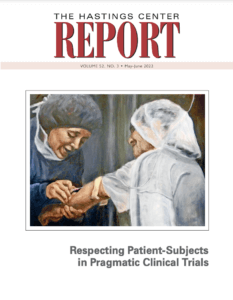 Respect for persons is a central obligation for the ethical conduct of research with human subjects. Traditionally, clinical trials have primarily relied on informed consent practices to fulfill this ethical obligation.
Respect for persons is a central obligation for the ethical conduct of research with human subjects. Traditionally, clinical trials have primarily relied on informed consent practices to fulfill this ethical obligation.
A new article in the Hastings Center Report proposes 8 dimensions for how researchers can meet the ethical obligation of respect for persons in pragmatic clinical trials. The authors, including members of the NIH Pragmatic Trials Collaboratory’s Ethics and Regulatory Core, developed the framework in recognition of the challenge many pragmatic trials face with traditional informed consent practices when embedding research into clinical care.
“What respect requires in the context of [pragmatic trials] will vary based on the nature of the [pragmatic trial] in question. In some circumstances, alterations of consent may be more ethically appropriate than traditional regulatory consent practices,” the authors wrote.
The dimensions of demonstrating respect for persons—including promoting transparency, minimizing burden, and protecting privacy and confidentiality, among others—serve as context-dependent goals that researchers and oversight committees can use in considering the ethical design, conduct, and oversight of pragmatic trials.
Lead author Stephanie Morain and coauthors Benjamin Wilfond, Andrew Garland, and Jeremy Sugarman are members of the NIH Collaboratory’s Ethics and Regulatory Core.


